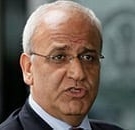Speaker

Saeb Erekat
Secretary General
Executive Committee of the PLO
Moderator
Event Summary
On July 15, 2020, Arab Center Washington DC’s Executive Director Khalil E. Jahshan held a virtual one-on-one discussion with Saeb Erekat, Secretary General of the Palestine Liberation Organization and chief Palestinian negotiator with Israel. Titled “Israeli Annexation and Beyond: Assessing Palestinian Options,” the session focused on the Israeli government’s declared plan to annex parts of the occupied West Bank, including the Jordan Valley, as well as on Palestinian responses to it.
Saeb Erekat began the briefing by stating that the July 1st date for announcing the plan for annexing parts of the West Bank “is not the deadline, but the starting line” as agreed to by Prime Minister Benjamin Netanyahu and his government partner Benny Gantz. He recounted the terms of the Trump Administration’s “Peace to Prosperity” plan for Palestinian-Israeli peace, announced last January, and said that its chief architect, Jared Kushner, “copied and pasted the Netanyahu package … I would say 100 percent.” Erekat also said that the Palestinians were expected to accept all the conditions that were laid out in that plan before a Palestinian state was even discussed. He summarized his opinion of the team that helped put together this plan as follows: “These people constituted the combination of arrogance and ignorance.”
Moving on to the issue of annexation, Erekat said that the Americans are playing a game in which they appear to be persuading Netanyahu to annex maybe six or eight percent of the territory in order to pressure the Palestinians back to the negotiating table. This, he affirmed, will not happen since the Palestinian Authority will not be part of any deal on annexation. He also said that the Trump Administration and Israel are studying the reactions of Jordan, Egypt, Europe, Russia, China, and others to gauge if they can go ahead with their plans. Erekat decried the fact that an international coalition has not been formed to oppose annexation, saying “we have not seen yet an international coalition telling Netanyahu: go ahead with annexation; there will be consequences.” He said Palestinians have not noted any pressure such as sanctions on Israel, although many countries have issued announcements and declarations opposed to Netanyahu’s plan.
As to Palestinian options, Erekat stated that Palestinians are doing everything in their power to abort annexation, including contacting regional and international communities to urge outright rejection of it. Palestinians, he asserted, still believe that the best road forward is the two-state solution; but if in the future Palestinian official bodies representing a majority of public opinion decide that the best solution is one state, then that will be the policy. At present, however, the reality is an apartheid existence because over the years, Netanyahu destroyed the two-state option. On the other hand, he said, if Netanyahu refuses to compromise to make the two-state solution possible, then he should be responsible for governing the entire area from the Jordan River to the Mediterranean Sea including paying employee salaries, hiring teachers, and collecting trash, among other duties a state in control should be doing.
Refuting accusations by friends of Israel that the problem is that Palestinians resent Jews and want to wage a religious war, Erekat said that “as Palestinians, Judaism to us was never a threat and will never be a threat. We don’t fight the Israelis over something in the holy book. Our conflict with Israel is a political one.” He asked, what will the future hold for Israel in light of the fact that, today, 50.9 percent of people living between the Jordan River and the Mediterranean are Palestinian? He said that the answer to this question should be one that concerns Israeli politicians.
Looking at US politics, Erekat said that the recent changes in political and public attitudes toward Israel and the Palestinians are encouraging. However, he decried the opinion of pro-Israel Christian evangelicals who use religion to advocate for total Israeli control. He criticized Secretary of State Mike Pompeo for saying that “he walked with Jesus to recognize the settlements.” Regarding the possibility of President Donald Trump losing the upcoming presidential election to Joe Biden, Erekat said that a different administration should start by restoring the status quo ante prior to 2017, reopen the American consulate in East Jerusalem and the PLO office in Washington, DC, and restore assistance to Palestinian refugees and social service organizations. Finally, Erekat repeatedly asserted that “no one benefits more from reaching an agreement and having an end to this conflict more than the Palestinians; and no one can lose more in the absence of peace than the Palestinians.”
Speaker Bio
Saeb Erekat has served as secretary general of the PLO Executive Committee since July 2015, when he succeeded Yasser Abed Rabbo. He is also a member of Fatah’s Central Committee and of the Palestinian Legislative Council as well as chief Palestinian negotiator with Israel. Erekat was previously a lecturer in political science at An-Najah National University in Nablus, Palestine, and served for 12 years on the editorial board of the Palestinian pan-Arab newspaper al-Quds. He received a BA in international relations and an MA in political science from San Francisco State University and completed his PhD in peace and conflict studies at Bradford University in England.

